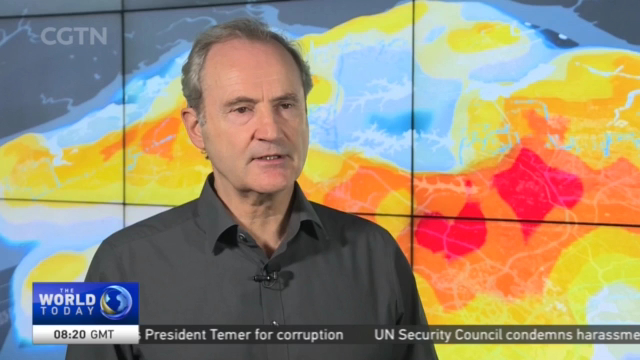
17:03, 22-Dec-2018
Singapore Environment Protection: Group tries to cool down city-state without using electricity
Updated
16:40, 25-Dec-2018
03:18

Changes in the global climate may affect countries differently, depending on their sizes and locations. For countries with more temperate climates, winters can get chillier. For tropical places like Singapore, flash floods from heavier rainfalls can become a problem, and an increased average temperature can also take a toll. CGTN's Miro Lu takes a look.
Singapore, a densely populated urban city that is very close to the Equator, has always had to battle heat. The Urban Heat Island effect, or UHI, has long affected the city-state. UHI is a phenomenon where buildings, roads, and vehicles release heat into the environment. Studies have shown that UHI can raise temperatures of up to 7 degrees Celsius.
Researchers from Cooling Singapore, a joint task-force launched last year, are researching strategic ways to cool the city down. For example, adding foliage to buildings, or including shading devices like canopies, or even varying building heights to capture wind - these all aid in cooling down the city without the use of electricity.
DR. GERHARD SCHMITT PRINCIPAL INVESTIGATOR, COOLING SINGAPORE "Climate change as we see it now is very concrete, and it will affect every city and every countryside. The most serious effects are the liveability of the cities. That will probably go down because it's just getting too hot to be outside, and that is serious for health as well."
To escape the heat, Singaporeans power up their air conditioners. Singapore household electricity consumption has increased by about 17 percent over the past decade. 24 percent of that consumption is attributed to the use of air-conditioners. The overuse of air conditioning increases energy consumption, which in turn increases carbon emissions. It becomes a vicious circle.
"It's definitely gotten hotter over the past few years, and even the usage of my air conditioning has increased."
"For the air cons in the mall, I don't know whether it's an overuse or underuse, but it definitely does keep me cool on hot day."
A spokesperson from Singapore's National Climate Change Secretariat, or NCCS, a department under the Prime Minister's Office, told CGTN that the city's infrastructure needs to be strategically planned in order to limit the use of air conditioning.
MIRO LU SINGAPORE "The government also encourages both businesses and individuals to choose more energy-efficient."
Researchers in the city believe that with the city's experience in combating UHI, the country has amassed a wealth of experience and information to face a changing climate head on.
DR. GERHARD SCHMITT PRINCIPAL INVESTIGATOR, COOLING SINGAPORE "Singapore has invested already many years in that, and it has invested also in research to figure out how these things are hanging together, and therefore it has an edge over other cities."
In addition to the increased heat, global warming also washes ashore several other problems including a rising sea level, increased rainfall, and a jeopardised food security. But with a concerted effort between the government, scientists, and private industries, it is clear that the republic is well-prepared for rainy days ahead. Miro Lu, CGTN, Singapore.

SITEMAP
Copyright © 2018 CGTN. Beijing ICP prepared NO.16065310-3
Copyright © 2018 CGTN. Beijing ICP prepared NO.16065310-3